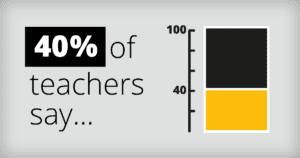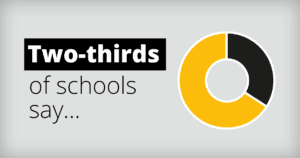Three things we learnt from teachers in the Pearson School Report by Pearson
Mary Long (CENMAC Deputy Team Leader) recently attended the launch of the Pearson School Report (https://bit.ly/3O8tNmd) and was excited to hear the findings of the recently conducted survey. In this week’s guest blog post from Pearson, they unpick three of the important matters that were highlighted in the report.
Three things we learnt from teachers in the Pearson School Report
As this academic year draws to a close, it feels like the right time to reflect on what we as an education community have experienced and our hopes for the future.
That’s why we at Pearson have continued to prioritise listening to educators’ experiences – to hear their challenges, recommendations and ambitions, as we strive to support them with whatever comes their way. But this year, we’re sharing and amplifying these reflections and hopes in a different way.
Our new Pearson School Report reveals what almost 7,000 teachers and school leaders think about education in schools in England today, as well as how it can be evolved for tomorrow. While there are too many insights to fit into one blog alone, here are three of the things schools told us.
1. They want to develop the ‘whole child’
Among the profession, there is a widespread appetite to consider the ‘whole child’ during their school journey, with 8 in 10 teachers saying that pupils’ social and emotional development is just as important as their academic development.

Over half of teachers told us that they currently spent less than 30 minutes of a working day developing pupils’ social and emotional skills. Two-thirds of primary teachers and a third of their secondary counterparts would like to devote more time to this each day.
2. More can be done to support the aspiration and achievement of certain pupils

Approximately 40% of teachers think that the current education system does not effectively support aspiration and achievement among even advantaged pupils, with other minority groups disproportionately affected.
When it comes to learners with special educational needs and disabilities (SEND), only 9% of teachers said that the system is effectively supporting them to aspire and achieve.

While six in 10 headteachers told us that they are planning to diversify their curriculum to cover disability, race and gender in the next two years, teachers were also keen to see more educational psychologists and better identification of needs and support in mainstream schools – elements discussed in the SEND and Alternative Provision Green Paper 2022.
As Shaun Brown at The Difference explains in the report, embracing a “universal model of inclusion’ and moving away from the concept that ‘normal = no needs” could be a key way to drive change here.
3. They have big plans and ideas for the future
When it comes to the curriculum and how education can evolve, teachers had so many plans and ideas to share.
Over half of teachers say that a better ‘digital curriculum’ is needed to prepare pupils for an online world and around 80% of teachers think that both digital wellbeing (including safeguarding) and digital literacy should be incorporated into the curriculum over the next 5–10 years.

Developing characteristics like resilience, kindness and self-esteem will be a focus so that pupils can thrive in 2022 and beyond and by 2024, two-thirds of headteachers are planning to create more sustainable and eco-friendly schools, and over half will be teaching climate change. They’re also planning to embed mental health and wellbeing across their curriculum and hope to teach life skills like managing your money and communication skills in the same way as English and maths.
Our report shows an education community whose collective compassion, dedication and expertise has, and will continue to be at the heart of nurturing the children and young people in today’s classrooms and the communities and workplaces of tomorrow.
And the conversation doesn’t end here. Guided by these insights, reflections and ideas, we look forward to collaborating, listening and learning from the whole education community to drive forward positive change and make educators’ hopes a reality.
You can read the Pearson School Report in full online.
And don’t forget to join the conversation – share your views on education today, and tomorrow, by tagging Pearson on socials with #PearsonSchoolReport.
Twitter @PearsonSchools Facebook @PearsonUKSchools LinkedIn @PearsonUK
Don’t forget you can share your CENMAC experiences for our CENMAC family to enjoy.




